Best Home Remedies for Oily Scalp and Hair
By Dr Rajeev Singh +2 more

Get,

to manage your symptom
Get your,


4 Cr+ families
benefitted

OTP sent to 9988776655



You’ve successfully subscribed to receive
doctor-approved tips on
Whatsapp

Get ready to feel your best.

Hi There,
Download the PharmEasy App now!!


Register to Avail the Offer
Send OTPBy continuing, you agree with our Privacy Policy and Terms and Conditions

Hi There,
Sign up on PharmEasy now!!
Trusted by 4 crore+ families

OTP sent to 9988776655



You have unlocked 25% off on medicines




Code: NU25
By Dr Rajeev Singh +2 more
Table of Contents
Are you worried about oily and greasy-looking hair? Here are some remedies that can be used at home to keep your hair oil-free and clean. Oily scalp and hair are common problems many people face at some point in their lives. Oily and greasy-looking hair can make people self-conscious. The scalp has more number of sebaceous (oil) glands present, which can contribute to the oiliness of the scalp and hair. Sebaceous glands present on the scalp produce a large amount of sebum (oil), giving you an oily scalp and hair1. Keeping the scalp clean is essential for getting healthy hair. If the presence of excessive oil on the hair and scalp makes you uncomfortable or self-conscious, you can contact your healthcare provider and get the necessary treatment. Do inform them of any past allergies from medications or any treatment that you may have taken. You can also use these remedies to help you eliminate the excess oil on the hair and scalp.

Oil glands are the glands present beneath the skin surface. These glands are more abundant on the scalp and face. Oil glands are formed alongside a hair follicle. Oil glands produce oil, which imparts oiliness to the hair and scalp1.
Several factors govern the secretion of oil on the scalp. These factors are:
Don’t brush your hair too much. While you should brush your hair as needed, over-brushing can cause the hair follicles to produce more oil.
Dr Ashish Bajaj, M.B.B.S, M.D. in Clinical Pharmacology and Toxicology
Signs of oily scalp and hair are the oily and glossy appearance of hair. Other serious symptoms of oily hair and scalp are given below.
Here are some remedies that you can make use of to take care of excessive oiliness of the hair and scalp.
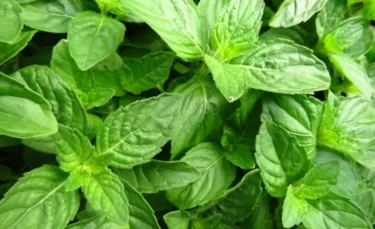
Tulsi leaf paste can be applied to the scalp to clean the hair roots and scalp. It may also soothe the scalp, improve blood circulation, and reduce irritation and dandruff. Irritated and damaged skin produces more oil. It is valuable for keeping the scalp healthy and promoting the growth of hair3. You can use fresh leaves of tulsi to make a paste. Apply this paste to hair and scalp evenly and wash it off with water after some time. Washing the hair and scalp with tulsi paste may help you get rid of oil from the hair and scalp.
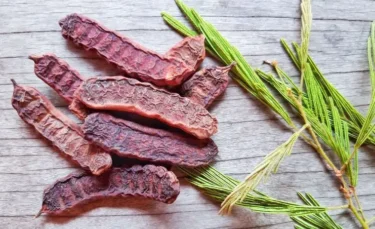
Shikakai is often used as a natural cleanser. It has been used traditionally to make herbal shampoos. Shikakai is used as an ingredient in herbal shampoos. It is valuable for hair3. You can use shikakai powder to wash hair and remove the oil from the hair and scalp. Shikakai powder can be used to wash the hair. You can also make shikakai powder to make a hair pack. Mix shikakai powder with some yoghurt to make a paste. Apply this paste as a hair pack. Use this hair pack once a week to get rid of excess oil from hair and scalp.
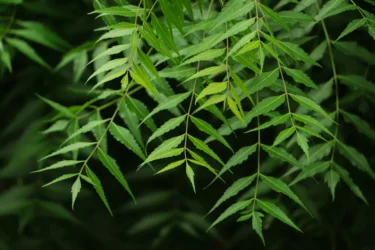
You can use neem leaves as a cleanser while washing the hair. Neem might help open the clogged pores on the scalp and promote hair growth. Neem is also effective against problems like dandruff, which can be caused by an oily scalp. You can use neem leaf powder to wash your hair3. Take some neem leaf powder and mix water to make a grainy paste. Apply this paste evenly to the scalp and hair. Let it be for some time. Wash it off using cold water to get clean hair and scalp.
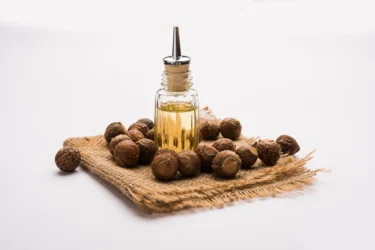
Reetha or soapnuts have good cleansing properties. It may also impart soothing effects on the scalp and make the scalp healthy3. Mix some reetha powder with water to make a smooth paste. Massage this paste on hair and scalp, leave for some time, and then wash it with water. It might help remove the dirt and oil from the scalp. Use this reetha paste as a hair mask whenever needed.
The antimicrobial qualities of apple cider vinegar make it effective against fungi and bacteria that cause scalp infections. Regular use of apple cider vinegar for hair wash can help you heal your scalp and become itch-free. Alpha-hydroxy acid, present in apple cider vinegar, is an exfoliant that cleans up scalp and reduces dandruff.
Dr. M.G. Kartheeka, MBBS, MD(Pediatrics)
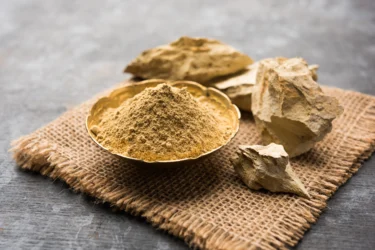
Fuller’s earth, known as Multani mitti in Hindi, is an excellent absorbent. It might quickly absorb oil and dirt from the scalp. To use fuller’s earth, you can make a paste by mixing fullers earth with water. This paste can be applied to hair and scalp to remove oil and dirt. The paste can be rinsed off using water afterwards4. You can use fuller’s earth as a hair mask whenever needed to get rid of excess oil from the hair and scalp.
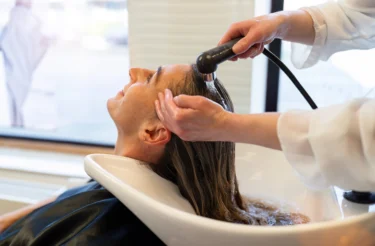
You can start washing your hair more often to remove all the accumulated oil and dirt. The frequency of hair wash depends upon how much oil is produced on your scalp. If your hair is too oily, you need to wash it at least once every day. For older people, frequent hair washing is not necessary as the scalp produces lesser oil5. You can make a herbal cleanser at home using herbs like amla, reetha, and shikakai and boiling them in water. Use the water after straining to wash the hair. You can also use Multani Mitti or fuller’s earth to wash your hair.
The scalp is where the oil gets accumulated and is transferred to the hair afterwards. Use more shampoo for cleaning the scalp. Using excessive shampoo on your entire hair might make it dull and course5. Choose a shampoo that suits your hair the best and does not cause damage by everyday use.
Also Read: Home Remedies For Hair Thinning
Avoid applying conditioner on the scalp or on the entire hair length. Using conditioners can make the hair and scalp greasier. If you need to use conditioner after shampoo, apply it to the hair tips and wash it properly afterwards5. You can use the conditioner of your choice.
Though there are studies that show the benefits of the given herbs and home remedies for dealing with oily scalp and hair, these are insufficient. There is a need for further studies to establish the true extent of the benefits of these herbs and home remedies on human health. Thus, these should be taken with caution and never as a substitute for medical treatment.
Over-washing of hair and scalp is ironically a major cause of scalp irritation and inflammation as it can dry out your scalp and trigger an increase in oil production.
Dr Ashish Bajaj, M.B.B.S, M.D. in Clinical Pharmacology and Toxicology
Oily hair and scalp are common problems people encounter at various points in their lives. It usually does not require medical intervention. However, some people may feel self-conscious because of excessive oil on their hair and scalp. You can seek medical help if:
You must not rely on home remedies alone for the management of oily scalp and hair. Neither should you self-medicate. You should consult a qualified doctor for any advice for oily scalp and hair if the symptoms don’t improve.
Also Read: Effective Home Remedies For Dry Scalp
The skin of the scalp is rich in oil glands, which are present along with the hair follicles. Sebum production on the scalp makes it oily. This oil is carried to the entire hair length. You may quickly get rid of oil from your hair and scalp by washing it frequently and taking proper care of your hair. There are many herbal ingredients that you can use to keep the hair and scalp free of oil. Herbs like shikakai, reetha, neem, and tulsi may be used to wash the hair and scalp to make it healthy and shiny.
You contact your skin and hair doctor (dermatologist) if the oiliness makes you uncomfortable and the home remedies don’t work out. If you are also affected by other hair problems like dandruff, itchiness or other medicinal allergies, don’t hesitate to contact your healthcare provider.
Also Read: Home Remedies For Itchy Scalp By Dr. Siddharth Gupta
You can get rid of the oily scalp by washing your hair frequently. If your scalp produces excessive oil, you need to wash your hair at least once a day to get rid of that oil5. You can use shampoo as well as natural herbs like tulsi, reetha and shikakai to wash your hair. These herbal remedies might help you get rid of oil and dirt from hair and scalp and also make the hair healthy3.
Herbal remedies that you may use to help get rid of oil from your hair and scalp are amla (Indian gooseberry), tulsi (holy basil), reetha (soapnut), and neem. These ingredients can be used to wash the hair and remove oil from the scalp and hair. You can use Multani mitti (Fuller’s earth) to absorb the excess oil and dirt from the scalp and leave the hair fresh and clean3,4.
Yes, you can use Multani mitti to help remove oil and grease from the scalp. Mix Multani mitti with water and make a smooth paste. This paste can be applied as a hair mask. Apply it evenly on hair and scalp, leave for some time, and then wash it thoroughly with water. Multani mitti might absorb all the oil from the scalp3,4.
Yes, if you have an oily scalp, it can also lead to dandruff. The scalp becomes oily due to excessive sebum production. The presence of sebum on the scalp creates an ideal environment for the growth of Malassezia (a fungus), which is responsible for causing dandruff2.
Reetha is a natural cleanser that may be used to keep the hair clean3. You can use reetha powder to make a hair mask. Mix reetha powder with water and make a paste. Apply it evenly to the scalp and hair. Leave the paste for some time, then wash it off with water.
1. Sakuma TH, Maibach HI. Oily skin: an overview. Skin Pharmacol Physiol [Internet]. 2012 [cited 2022 May 17];25(5):227–35. Available from: https://pubmed.ncbi.nlm.nih.gov/22722766/
2. Lourith N, Kanlayavattanakul M, Nualsri C. Development and clinical evaluation of green tea hair tonic for greasy scalp treatment. Journal of Cosmetic Science [Internet]. 2016;67:161–6. Available from: https://www.researchgate.net/publication/308149951
3. Pal RS, Saraswat N, Wal P, Wal A, Pal Y. Preparation & Assessment of Poly-Herbal Anti-Dandruff Formulation. The Open Dermatology Journal. 2020 Jul 14;14(1):22–7. Available from: https://opendermatologyjournal.com/VOLUME/14/PAGE/22/FULLTEXT/
4. Madnani N, Khan K. Hair cosmetics. In: Indian Journal of Dermatology, Venereology and Leprology. 2013. p. 654–67. Available from: https://ijdvl.com/hair-cosmetics/
5. American Academy of Dermatology Association. Tips for healthy hair [Internet]. [cited 2022 Jun 8]. Available from: https://www.aad.org/public/everyday-care/hair-scalp-care/hair/healthy-hair-tips
Disclaimer: The information provided here is for educational/awareness purposes only and is not intended to be a substitute for medical treatment by a healthcare professional and should not be relied upon to diagnose or treat any medical condition. The reader should consult a registered medical practitioner to determine the appropriateness of the information and before consuming any medication. PharmEasy does not provide any guarantee or warranty (express or implied) regarding the accuracy, adequacy, completeness, legality, reliability or usefulness of the information; and disclaims any liability arising thereof.
Links and product recommendations in the information provided here are advertisements of third-party products available on the website. PharmEasy does not make any representation on the accuracy or suitability of such products/services. Advertisements do not influence the editorial decisions or content. The information in this blog is subject to change without notice. The authors and administrators reserve the right to modify, add, or remove content without notification. It is your responsibility to review this disclaimer regularly for any changes.
Comments

Leave your comment...
You may also like
Comments